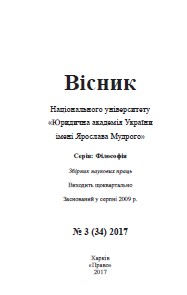ЛОГИКА СОВРЕМЕННОГО РЕЛИГИОЗНОГО СОЗНАНИЯ
THE LOGIC OF CONTEMPORARY RELIGIOUS CONSCIOUSNESS
Author(s): S. V. KachurovaSubject(s): Logic, Philosophy of Mind, Philosophy of Religion, Politics and religion
Published by: Національний юридичний університет імені Ярослава Мудрого
Keywords: religion; consciousness; reasoning; philosophy; excess; Religious expertise;
Summary/Abstract: The article is a logical reconstruction of the main elements of modern religious consciousness. For this, a form of inference is used that should satisfy the requirement of system analysis. The most important role in this system is played by the phenomenon of secular consciousness. Here he acts as a general mediator (medius terminus). The originality of its ontological status is underlined. Accordingly, here arises the question of opposites (extreme terms), the opposition of which should remove this secular consciousness. To solve this problem, the author turns to the history of world religions. At the «junctions» of these religions, two forces always find themselves, the contradiction between which is the engine of this history. This, first, the strength of the religious tradition conservative element), and, secondly, the power of religious innovation (a revolutionary element). Contrary to popular belief about the decay of religious life, the author defends the thesis that in a certain sense this confrontation between religious tradition and religious innovation will always exist. As long as a person is alive and thinking, he will be concerned about the question of God. Only in modern times, the struggle between the old and the new in religion has one distinctive feature. In history, it was resolved naturally: old civilizations and cultures, the core of which was a certain religion, died and replaced by new ones. Now the entire responsibility for this withdrawal fell on the shoulders of the modern secular state. Thus, the reasoning of modern religious consciousness has developed completely in itself and for itself. It has acquired the following character: «religious tradition – secular consciousness – religious innovation». Here the author uses the «horizontal» form of inference, which Hegel suggested in his Science of Logic. This form allows not only to structure the basic elements of this system, but also to consider further ways of its development. The latter is especially important in connection with the complex of problems that arise before a secular state in connection with the theory and practice of conducting a religious expert examination. The causes of the emergence of the system of modern religious consciousness are analyzed. It establishes its relationship with the process of historical development of religion and philosophy.
Journal: Вісник НЮУ імені Ярослава Мудрого. Серія: Філософія, філософія права, політологія, соціологія
- Issue Year: 34/2017
- Issue No: 3
- Page Range: 142-154
- Page Count: 13
- Language: Russian

